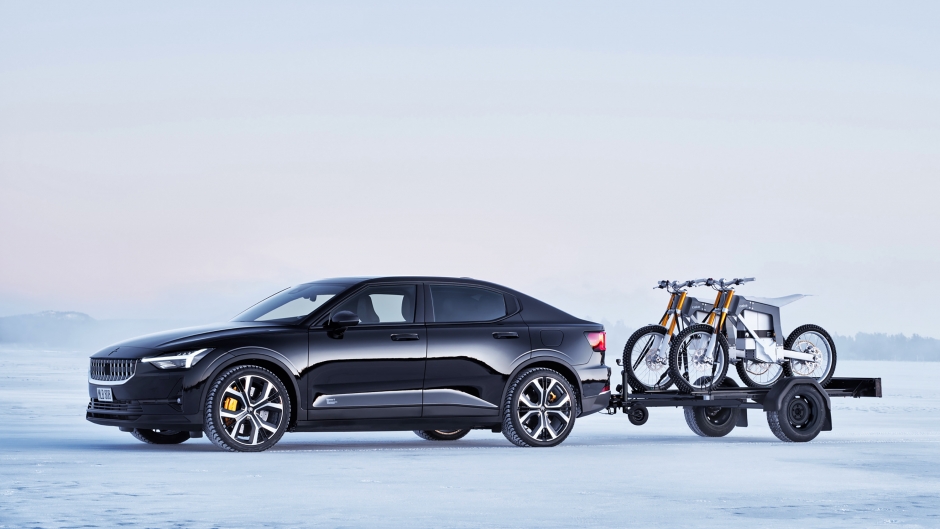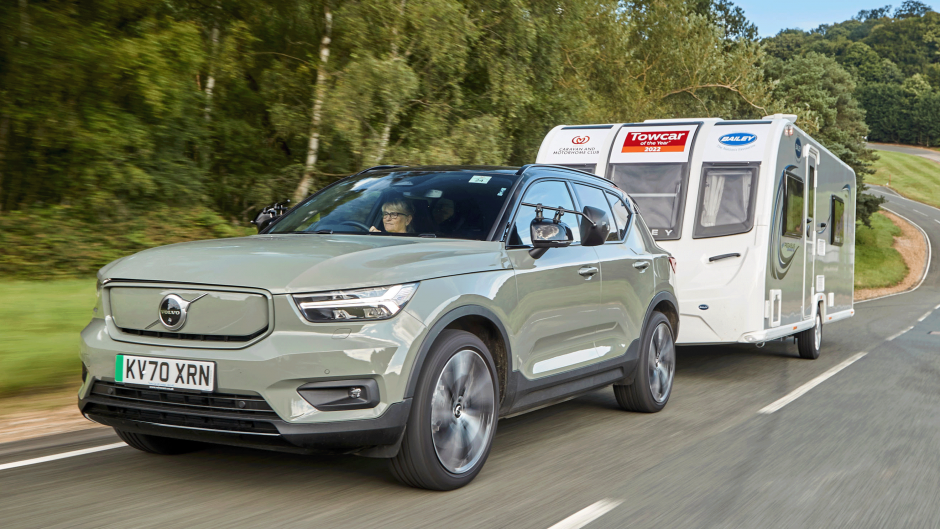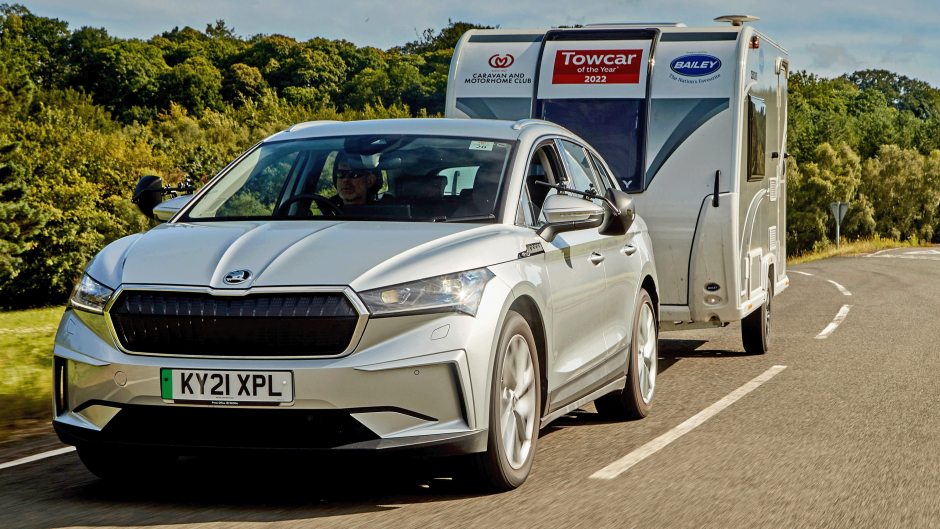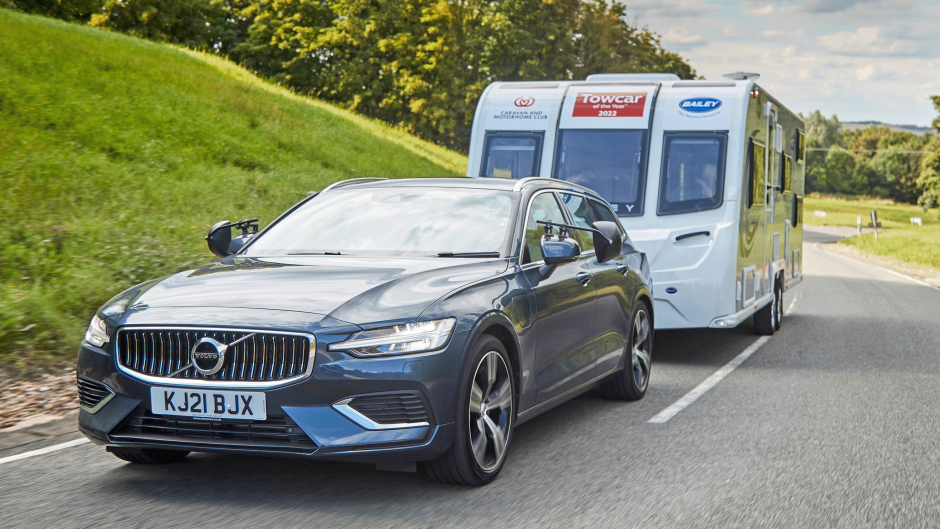Electric car towing capacity: can you tow a caravan with an electric car?
Wondering whether you can tow with an electric car? And how do EVs compare with petrol and diesel alternatives? Keep reading for answers

Ever wondered whether you'd be able to tow a caravan with an electric car? Well, it's something of a confusing subject, because towing something heavy with a car will have negative impact on fuel efficiency, or battery range in the case of electric cars.
Car manufacturers are still desperately trying to get their electric cars up to a par with petrol or diesel alternatives in terms of the number of miles they can travel on a single charge. So having to quote vastly reduced battery range figures for towing purposes seems a touch counter productive.
On the other hand, one of the headlines of electric cars is their instant power delivery. The electric motors are able to produce full power in an instant, as opposed to a traditional petrol or diesel engine that needs to get some revs up before it can achieve full power. The most important aspect of a strong tow car is its ability to get the extra weight of a caravan, horsebox or trailer moving at slow speed; on this basis, the instant power of electric cars should make them ultimate towing machines. So, why are so few electric cars quoted with a towing capacity?
It is possible to tow with an increasing number of electric cars. Yes, you can expect your battery range per charge to drop substantially if you're towing a heavy load, but in truth that's no different to driving a petrol or diesel car, where the larger the load, the worse your fuel economy becomes.
Keep reading below for all the answers on how to find a suitable electric car for towing, and head over to the BuyaCar search page to find so great deals on used electric cars if you're ready to kick-start your used car journey.
What is a towing capacity?
Towing capacity is the quoted mass that a vehicle can safely tow according to its manufacturer. There are two common types, braked and unbraked. A braked towing capacity refers to the maximum mass a vehicle can tow when whatever it is towing has its own brakes. An unbraked towing capacity, on the other hand, is the maximum mass a vehicle can tow when what it is towing does not have its own brakes.
Braked towing capacity, therefore, is higher than unbraked, as the car can tow more weight safely, thanks to the additional stopping power provided by the trailer having its own braking force. This ensures that heavy loads don't overpower the car's brakes, as the more weight they have to stop, the longer the car and trailer will take to stop.
Therefore, a car with a braked towing capacity of 1,500kg and unbraked towing capacity of 750kg could tow a caravan weighing up to 1,500kg if it came with its own braking system or 750kg if it did not.
Since it's normally more powerful, larger and heavier vehicles that have the highest towing weights, it's normally bigger and more expensive cars that offer the highest on-paper towing capacities. This doesn't mean you have to pay through the nose for a large, super-powerful car, though.
It's important to have a good idea of the size of load - and more importantly the weight - that you plan to tow. If you only plan to tow a set of kayaks on a lightweight trailer, you should be able to find a suitable small and affordable car for the job.
Can you tow with an electric car?

Absolutely. In fact, electric cars are arguably better suited to towing than petrol or diesel alternatives. At the same time, some argue that using an electric car for towing is worse than fossil fuel-powered vehicles. To understand why let’s consider what makes a good tow car.
First up we have torque - low-engine-speed muscle. Typically diesel engines provide more torque than similarly sized petrols. However, modern turbocharged petrol cars can also offer plenty of punch at low engine speeds. Torque is generally referred to by a 'Nm' figure, that is often provided alongside a 'hp' figure, that shows how much high-engine-speed power the car produces. The higher the Nm figure, the more torque the car has.
As a result, the best tow cars are those that produce as much torque as possible from very low engine speeds, meaning that the driver doesn't have to work the engine hard to get a heavy load moving. When comparing Nm figures, be aware that you might see an 'rpm' figure. This shows at what engine speed that torque is available. The lower the rpm figure, the lower the engine speed needed to access that muscle and the more suitable the car is for towing.
What gives electric cars an advantage here is the fact they can produce maximum torque as soon as their electric motor (or motors) starts turning. As a result, there's no need for gears since the car pretty much produces maximum torque all the time - making them equally capable at pulling away from a standstill with a heavy load behind or overtaking a tractor on a country road safely.
Just remember that while electric motors may offer maximum torque instantly, that doesn't mean that all electric cars have lots of muscle. A Tesla Model X will offer a lot more pulling power than a small, more affordable Renault Zoe, for instance. As a result, you can expect the Tesla to be a far more capable car when it comes to towing.
Then you have the mass of the car itself. If a vehicle is too light then whatever is being towed could overpower the car when cornering, stopping or accelerating, while a car that is too heavy would be using up a large proportion of the weight that the engine can cope with simply moving itself, reducing the braked and unbraked towing capacities.
Compared to an average petrol or diesel car, electric cars tend to be fairly heavy, thanks to the large, weighty battery packs needed for them to be able to travel a reasonable distance per charge. Take the Volkswagen Golf for example. A 2019 VW Golf equipped with a 1.5-litre petrol engine tips the scales at 1,280kg, creeping up to 1,295kg when a 1.6-litre diesel engine is fitted.

The electric e-Golf (with all its heavy electronics) comes in at 1,615kg, meanwhile. Furthermore, hybrids are often even worse thanks to having a petrol or diesel engine plus a heavy high-voltage battery pack and an electric motor.
Finally, the last great tow car trait is brilliant brakes. Naturally, having more mass hurtling down the road means it takes more to stop it. Electric cars have an advantage here as they can use regenerative braking to slow down - this uses the electric motor to slow the car down - as well as conventional brakes.
In summary, it’s a bit of a mixed bag as to the advantages and disadvantages of using an electric car to tow compared with petrol or diesel alternatives. However, it still begs the question, if electric cars are potentially better at towing, why are so few provided with towing capacities?
Towing something requires a lot of energy and using more energy in an electric car means you reduce the distance you can travel per charge - something that is already a concern for many potential electric car drivers, even those who don't plan to tow.
It is for this reason that many car makers don’t bother jumping through the extra hoops (and costs) of getting their electric cars certified to tow just to end up with a tiny electric towing range.
At the same time, towing hasn’t been viewed as a priority for electric car owners to date. This makes sense as many electric cars are being pitched as the perfect answer for urban driving where towing is much less common than in less built-up areas.
Other low-emission towing options

Currently, hybrids offer a much better spread of towing capacities than all-electric vehicles. Remember there are two main types of hybrid cars, plug-in hybrids and self-charging hybrids meaning they don’t ever need connecting to the mains. Naturally, though, the latter come with very short electric-only ranges.
Of the hybrid vehicles on offer, towing capacities range from terrible to impressive. The entry point to the useful towing capacity world is 750kg – any less than that and you might as well not bother. Cars such as the Hyundai Ioniq - available in self-charging and plug-in form - and the self-charging Toyota C-HR all come with a 750kg towing capacity.
For those needing more towing capacity, vehicles such as the Mitsubishi Outlander plug-in hybrid, which offers a 1,500kg towing capacity and the Toyota RAV4 self-charging hybrid, with its 1,650kg towing capacity are available. Meanwhile, should you need to tow something altogether weightier, the Audi Q7 e-tron can pull up to 2,800kg while the Porsche Cayenne e-Hybrid can pull up to 3,500kg.
Diesel vs petrol vs electric vs hybrid
To help demonstrate the different types of tow cars on offer, the models below are examples of electric cars which are available with towing capacities, plus comparisons of petrol, diesel, hybrid and electric vehicles. All prices exclude the UK Government’s plug-in car grant and all economy and emissions figures come from the latest - and most stringent - WLTP test conditions.
Electric tow cars
There is a growing number of electric tow cars available with diesel-rivalling capabilities. Most are SUVs, though there's a selection of other bodystyles too, including hatchbacks and saloons.
|
Make and model |
Jaguar I-Pace |
Audi e-tron |
Tesla Model X |
|
Towing capacity |
750kg |
1,800kg |
2,270kg |
|
Price |
|||
|
Range |
292 miles |
237 miles |
314 miles |
Volkswagen Golf/ID.3
|
Engine type |
Petrol |
Diesel |
Hybrid |
Electric |
|
Model |
Golf Style 1.5 eTSI 150hp DSG |
Golf Style 2.0 TDI 150hp DSG |
Golf Style 1.4 TSI eHybrid DSG |
ID.3 Pure Performance 204hp Life |
|
Towing capacity (braked) |
1,500kg |
1,600kg |
1,500kg |
0kg |
|
Price |
||||
|
Economy (combined) |
49.9mpg |
62.2mpg |
300.0mpg |
4.0mi/kWh |
Hyundai Ioniq
|
Engine type |
Hybrid |
Plug-in Hybrid |
Electric |
|
Model |
1.6 GDi 141hp |
1.6 GDi 141hp |
120hp |
|
Towing capacity (braked) |
750kg |
750kg |
0kg |
|
Price |
|||
|
Economy (combined) |
62.8mpg |
256.8mpg |
4.5mi/kWh |
Mitsubishi Outlander
|
Engine type |
Petrol |
Plug-in Hybrid |
|
Towing capacity (braked) |
1,600kg |
1,500kg |
|
Price |
||
|
Economy (combined) or range |
32.5mpg |
156.9mpg |
